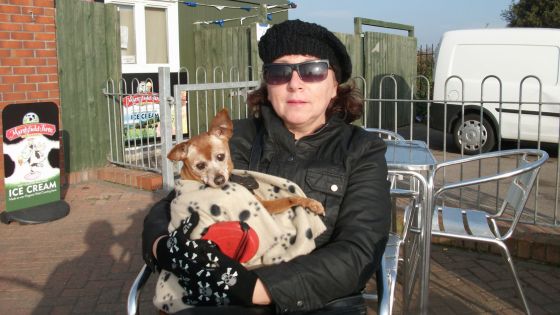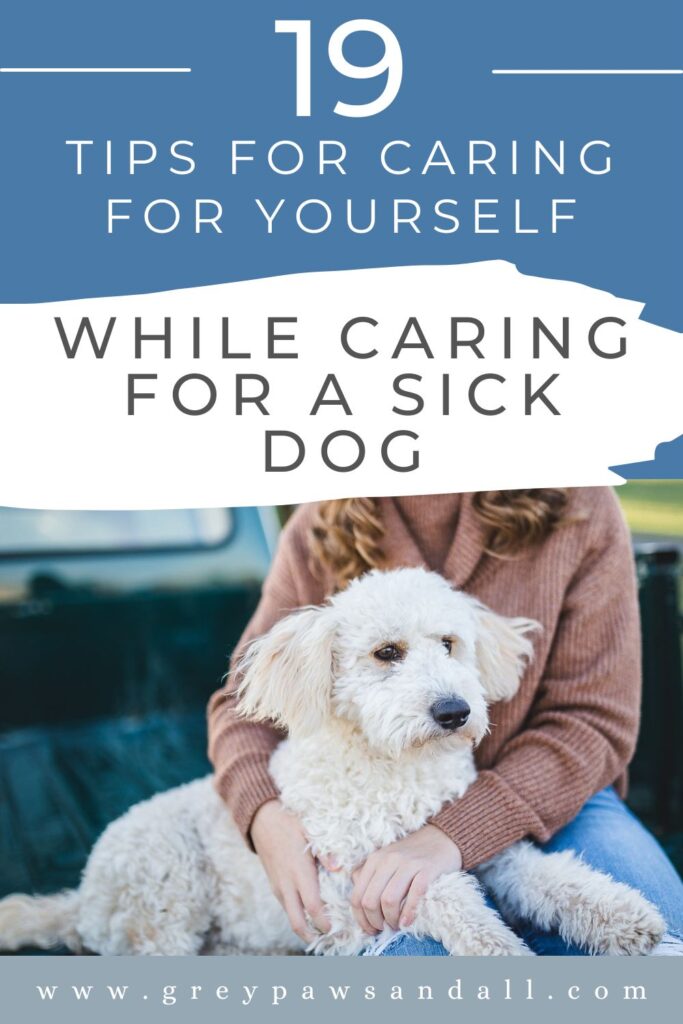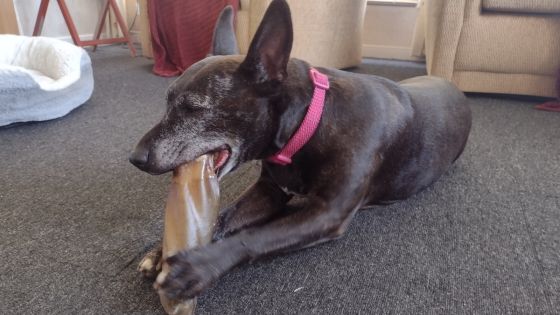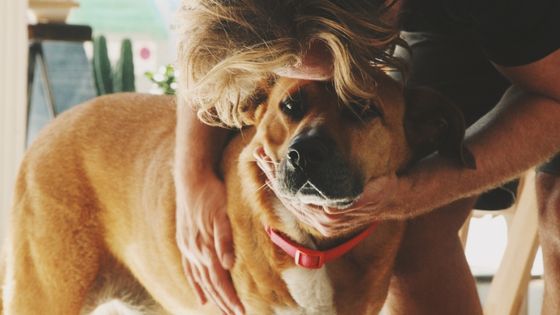As senior dog parents, we give so much of ourselves ensuring our dogs get the best care possible. We worry when they’re not feeling well, we panic when they won’t eat and we lose ourselves in thoughts of the day we’ll have to say goodbye.
From putting aside 10 minutes a day to meditate or walk around the block, to finding a support group and asking for help, these are some of the ways you can care for yourself, so you can take better care of your sick dog.
I have read so many accounts of those who are caring for sick dogs and these people are stressed, anxious, sad, confused, heartbroken, sleep deprived… Some find themselves yelling at their dogs, then living with the guilt afterwards. I can relate as I too am caring for a sick dog, and I too have been so stressed I had nowhere to turn. I also have to remind myself I’m human, and that I better learn to take care of me as well.
I know my FB group has been a refuge, a place to vent and talk to others who can relate since many, myself included, have nowhere else to turn for the comfort and understanding we need. You can’t know how moved I am to be able to offer this to so many…but I know sometimes even that isn’t enough.
So while we’re devoting most, if not all of our days to caring for our dogs, who’s caring for us?
Let me mention that although I talk about dogs, the advice you’ll find in this article will help no matter who you’re caring for…and that includes humans!!
NOTE: This article was originally written when my heart dog Red was still with me, and dealing with dementia. I have now updated it and writing it in the past tense. I do currently share my life with Jack, who has his share of health challenges.
How I Coped
According to my husband, not very well!! At times that has been true, especially before I knew Red had dementia, but generally I disagree. Never mind that, let’s backtrack a bit.
Red, the love of my life, was around 8 when we adopted her and shared my heart and home for 9 ½ years. I first met her while volunteering at a shelter in Florida. I was living with family at the time while looking for a house, and they had enough dogs and cats I couldn’t ask to add to their brood!! I had to love Red mostly from afar, except for once a week when I went to volunteer.
She died in May 2018, but about 2 ½ years before she died, I noticed she would wander a lot and not settle. She had kidney issues at the time and was having trouble concentrating her urine, which meant she peed a lot. I assumed she was uncomfortable because of her kidneys, and of course took her to the vet more than once for answers. Tests kept coming back fine and my vet couldn’t find anything wrong with her, but knowing her as well as I did I knew there was something.
In the meantime I was becoming beyond stressed. Although Red was blind she got around really well, and rarely bumped into anything even when in a strange environment…until then. I couldn’t get her to settle, she would wander for literally hours, and I would keep hearing her banging her head. It was heart breaking and I felt so helpless.
Sometimes you don’t realise how stressed you are until one tiny thing tips you over the edge. I’m home and with my dogs all the time, with barely a break. Anyway it got so bad there were times I would have to leave the house, it didn’t matter where I went. Sometimes I would grab my headphones, plug my music in my ears and power walk along the beach, other times I would leave my husband in charge when he was home on a Saturday and go shopping for a few hours. I’ll tell you what, it did me a world of good. So did listening to guided meditations, even if they were a short 5 or 10 minutes.
But you know the one thing that was the most helpful above all else? Figuring out what was wrong.

Dementia
One day the word “dementia” popped into my head, and I realised that was the problem. I only adopt old dogs with health issues and I don’t typically have them too long before they pass, so I’ve never had to deal with that disease before. Somebody was obviously trying to help me by planting that thought. Thank you!! When I called my vet to tell him about my “ha ha” moment (as my husband calls it) he said it made sense.
He’s a truly amazing vet but why he didn’t think about it I don’t know. Anyway, with a box of Selgian in hand (the UK drug with selegeline) I saw an improvement in Red in only a matter of days.
We were on the road to a calmer life…for awhile.
Her dementia was getting a bit worse but still under control. She’d had several bouts of pancreatitis, one so severe we almost lost her in November, and before that she had a few seizures over the course of about a year.
I bring this up to let you know how much I can relate to what you’re going through.
Read this ⇒ “A Comprehensive Guide to Dog Dementia“
Read this ⇒ “Does Your Senior Dog Have Dementia”
Read this ⇒ “How to Treat Dog Dementia“
I Don’t Recommend These Tips Lightly
You may think it’s easy for me to say “think about yourself” – “get a pet sitter so you can take a break” – “go on a short vacation” etc… but trust me it isn’t. Go on a vacation? Ha, I have to force myself.
The thing is, just because some of these tips are hard or feel impossible, doesn’t mean they aren’t exactly what you need!
Will all of them be right for you? Of course not. Will they all be doable? No they won’t, but there are so many you’re bound to find something you’ll be comfortable with.
Taking Care of Yourself Means Taking Better Care of Them
A cliché to be sure, but the absolute truth. When you’re a nervous wreck you’re not at your best, and your dog needs you at your best. When I was stressed I still did everything for Red, but it was easier and I felt better when I was relaxed and calm.
Do Something Before You’re Burnt Out…Unless You Already Are!
I don’t think I’m exaggerating when I say, the majority of us wait until we’re tearing our hair out before we start looking for ways to calm down. Sometimes we feel like we’re handling things, and the next minute we’re in a heap on the floor, crying with our dogs in our arms. Sound familiar?

Here Are My 19 Tips and Please Give Some of Them a Try!!
1) Focus on what you can control, forget about what you can’t
This one is rich coming from me since I’m a control freak, but given some thought it does make sense.
Fact – Your beloved dog is sick and that is not in your control
Fact – there are lots of things you can control –
- Ensure he has a great vet you trust
- Research treatments (your vet doesn’t know everything!)
- Get second opinions
- Join FB groups where members are dealing with the same issues
- Keep your dog comfortable
- Make sure he’s still part of the family
- Accept it could be awhile before he’s feeling better
- Prepare yourself mentally that some days will be harder than others
- Line up some help so you can take breaks
- Make a list of the ideas below that appeal to you and start implementing them
See how much is in your hands?
2) Look for the lesson or the silver lining
What good could possibly come out of this sad experience you ask? I know it’s tough to see any silver lining in all this, or believe there are lessons that can be learned…but perhaps there is and there are!
- Can you help others going through this same experience?
- Have you become aware of how much more compassionate you have become?
- Has it made you appreciate your own life more?
- Do you see how deeply and completely you can love another being?
- What about your experiences with the veterinary care your dog is getting? Do you have a great vet or has this helped you figure out what you need in a health care provider?
- Has your pup’s illness forced you to slow down, relax, re-organise your priorities?
- Perhaps you’ve found a new calling – veterinary nurse, anticipatory pet loss support volunteer or counsellor
3) Deep breathing exercises
For years I heard how deep breathing exercises can relieve stress, but I never believed it. Until I tried it and it worked! It’s super easy and you can do it anywhere, anytime, even sitting in a parked car. Don’t wait until you’re stressed to do it.
Take a deep breath in, hold for 5 seconds, let it out slowly and repeat. Do it a few times in a row, several times a day. Simple!
The not so simple part, at the beginning, will be keeping your mind focused on your breathing, and not letting it wander to the very things you’re trying to calm down about. It’s a challenge for sure, but with practice you’ll be able to block out most, if not all, stray thoughts that keep popping into your head.
4) Guided meditation
Search Youtube for “guided meditation” where you’ll find plenty to choose from. If you’re impatient, don’t think it’s for you, or there’s no time to spare, try it anyway. While some are an hour or longer, plenty are just a couple of minutes so start with those and see how it goes.
I only listen to ones that are guided because my mind very easily wanders, so having a voice to focus on helps.
Don’t worry if you didn’t hear one word because you were too busy thinking about Fido, it’s normal. It can take a lot of practice to focus on the voice but that’s okay, even if you manage to do it for just a few seconds consider that a victory and try again later. You’ll be pleasantly surprised at how relaxing a short session can be, and how invigorated you will feel afterwards. Don’t give up too quickly because you’ll be missing out on a free and easy way to relax.
The more you meditate the calmer you will become, and the less easily stressed you will be. The great thing is you can do it any time of day, it doesn’t cost a penny and all you need is a quiet space.
5) Find a support network
Your best friend who has been there for you during your latest break up or part of every major life event, may not be the source of comfort you’re looking for in this situation.
Not everyone, even other animal lovers, can relate to what you’re going through. That’s not to say they won’t do their best to comfort you, but it may not be enough. Unless they are or have been in the same boat, they just can’t relate and it’s as simple as that.
♦ Find a group of likeminded people you can share your grief, fears and concerns with who won’t judge you, whether that is in person or online. If you prefer a group you can attend in person, a search for support groups in your area is a good place to start.
♦ Some local pet loss groups may also welcome those with seriously ill pets.
♦ Facebook has lots of groups to join (including mine) where you can find an instant community.
♦ What about a chat room? The Association for Pet Loss and Bereavement has the Anticipatory Bereavement Chat Room, set up to help people prepare.
♦ For one on one support find a grief counsellor in your area, and yes there are those who specialise in pet grief.
♦ If you can’t find what you’re looking for why not create it!
6) Practice mindfulness/being present in the moment
How many times are you walking the dog and talking on the phone? What about vacuuming and thinking about all the things on your “to do” list?
Mindfulness simply means being present in the moment, and it’s a beautiful concept. Imagine living your life only in the here and now, not trying to change the past or predict the future just living in the moment. We’d all be a lot happier, of that I am convinced.
I’ve tried it, felt the difference but never stuck with it because I’m too busy living in the past and future myself but I am going to start “trying” again. As tough as it is to do, it is worth practicing for the incredible benefits you will gain.
How do you do it? Every time you notice yourself thinking of the past or worrying about the future, force yourself to think of the “now.” Of course it’s hard, especially if you have a mind like mine which my husband thinks is like a circus. All that means is you have to work harder. It’s about practice.
Here’s an example. I’m typing this article but at the same time I’m thinking of what I have to pack for my upcoming trip, why haven’t I put my makeup on yet and who knows what other chatter. Yet when I remember I should be present in the moment I am conscious of the letters forming across my screen, I am feeling the keys as I press each one, and I see my fingers flying across the keyboard. I don’t know how to explain what a strange sensation it is watching my fingers type these words – surreal in a way but focused on the moment…as I should be.
How does that apply to caring for your sick dog? It is way too easy to let your mind focus on regrets, wondering if you waited too long to take him to the vet, if you missed critical signs, how much time he has left and how heartbroken you’re going to be. By doing that you’re not leaving any room for the present and you’ll be missing spending quality time with your dog, enjoying walks together, feeling good when he eats his meals…
The present is where your dog is living, don’t you want to make every moment with him count?

7) Ask for help
That’s rich coming from me because I cannot ask for help. My friends have to beg me to ask them for a favour and I hate it!! It’s a very rare occasion when I do, and I have to be really desperate!
Don’t follow my example, especially because it’s super important to have some help in this situation. You cannot do all this alone, even if you have been until now. If you share your home with others, remind everyone the dog is a member of the family, so their assistance is needed. They’re not self starters? Delegate specific tasks and get them to commit. Having to check up on them all the time will not help, and you’ll end up doing everything yourself again!
If you are on your own, ask if a friend, family member or trusted neighbour could come in and give you a hand.
8) Take a break and re-fuel
I know you don’t want to leave your dog alone for a second, and I have no doubt you’re petrified something will happen when you’re out. Okay if he’s that ill I understand you need to be with him, but if that’s not the case you need to step outside into the world, even if it’s just for a bit.
If there is no way you would leave him alone, find yourself a pet sitter or dog walker who can keep him company. In my experience there’s usually at least one person in a vet practice who does pet sitting on the side, so start there.
- Treat yourself to a massage or a facial
- Take a meditation class
- How about some yoga?
- A walk in the park or the woods, just you and nature, is extremely healing
- When is the last time you saw a movie or got dressed up to go to the theatre?
- Have your friends or family forgotten what you look like? Drop in for a drink and a chat
- Think about what energises you and gives you joy, then go and do it.
Wait, taking a break doesn’t have to mean always leaving the house. Take a nap or a bath, read that book you’ve been wanting to or invite someone over for some adult conversation…and don’t talk about the dog!
9) Forgive yourself and know you’re doing your best
I know this is a real tough one, and I know this from experience. To be honest, there are things I haven’t been able to forgive myself for, even after many years. The guilt has lessened but only slightly, yes I have learned but totally forgiven myself? No. Which is not to say you shouldn’t and can’t! After all, what good is all the guilt doing for me or you?
We all wish we had “known” in advance rather than making mistakes or trusting the wrong vets, but as much as we would like it to be different, life isn’t like that and we just can’t know everything.
We can only do the best we can do with the knowledge and information we have at that time, and you have to keep reminding yourself of that. It’s hard to admit, hard to accept but it’s all there is.
If you can’t stop beating yourself up please speak to a professional – that’s called asking for help, something we already discussed. You will see how healing it can be.
10) Prioritise
When you’re going through a period of caregiving things are going to change, yet life keeps on moving forward, and there are still things that need to get done. Children need help getting ready for school, you have deadlines at work, bills to pay, meals to cook, houses to clean, cars to service and a whole lot more of what makes up this wonderful adventure called “life.”
With the amount of time you’re going to want/need to be there for your dog, you’re going to have to set priorities and decide what things will have to be put on hold, done by someone else or no longer get done until…
11) Use affirmations
An affirmation is basically a phrase or statement you keep saying to yourself. For instance, when the voice in your head says “I am so stressed I can’t cope” guess what? That becomes a self-fulfilling prophecy. Conversely when you say “I am at peace” you’re going to be pretty darn relaxed.
Here are a few examples of the types of things you should be saying. Feel free to create your own affirmations that resonate with you.
- “I am making the remaining time I have with Fido the best it can be”
- “I am doing my best for Spot”
- “I am calm and relaxed”
Whatever phrases you come up with, make sure they are positive and in the present tense.
Say them a few times a day, and even if you don’t mean the words at the time, eventually you will. Standing in front of the mirror makes your affirmations even more effective.
12) Allow yourself to feel
When I was stressed caring for Red I thought it was pretty obvious to me when I was, yet it’s interesting how stressed out someone can be without even realising it. Here is an example written during that time frame.
Red had quite a serious bout with pancreatitis in November, I even got as far as making “the” appointment because she was not recovering after almost 3 weeks. The day of the appointment she perked up and was fine, until she had another minor bout a couple of weeks ago. She recovered from that very quickly because I caught it right away and had the medication on hand.
I thought I was fine until my husband brought Red home after being at the vet on fluids. When I saw they had left the catheter in her arm I freaked. She had already had two days of fluids and was not going back for a third. They knew I had an appointment with my vet the next morning so I assume that’s why they left it in, but I still had a meltdown.
The practice was closed so I couldn’t go back or yell at them, and I didn’t want to pull it out myself. I went to a neighbour who is a nurse and asked for help. Yep I asked, and yes it was because I was desperate. She was hesitant to do it because she didn’t know how a dog would react so said no. I looked it up on Youtube and it seemed simple enough, but I didn’t have anyone to help and didn’t want to ask the nurse and pressure her.
Having no one to help me sent me into hysterics. We went home and I sobbed uncontrollably with Red in my arms for 45 minutes. Poor dog was soaking wet!
As pet caregivers we’re often on roller coasters. One day they’re feeling better so we’re up, then they have a bad day and we’re down, then we’re worried what’s going to happen next, we’re exhausted because we haven’t slept in days, anxious, depressed etc…etc…etc…
Expressing your feelings and admitting you’re struggling does not make you a bad pet parent, but it does make you human. Recognising those feelings will go a long way to helping you cope, but it’s also important for you to know where to turn for emotional support. That doesn’t mean you’re not handling things, it just means that support will help keep you mentally and physically healthy so you can do even more for your dog.
There is a section further up about finding a support network so you’ll find advice there.

13) Have a good laugh
With everything you have going on, laughing is probably the very last thing you can imagine doing. You’re caring for a sick dog who it seems you love more than life itself, what can there possibly be to smile about?
Please don’t feel guilty for taking the time to enjoy yourself, or for one second think it means you don’t love or care for your dog. You know what it does mean? It means you understand that when you take care of yourself you’ll be a better caregiver. You probably miss having a good laugh, right?
Do you have a friend whose company you enjoy because you always have such fun together? When was the last time you watched a video of your favourite comedian? How about that comedy show you used to love?
14) Eat, sleep and exercise
In the best of times many of us don’t do a great job when it comes to maintaining a healthy diet, getting enough sleep or doing enough or any exercise. Add caring for a sick dog to the mix, and you’re putting your own health at risk. How’s that going to impact your dog?
15) Healthy diet
Who has the time, energy or inclination to cook, especially when you can order take out or visit the local drive thru? If you do plan on sticking with this way of eating, try and choose healthier options.
Maybe you can agree to cook a couple of times a week, make big batches and freeze. I love soup with tons of “stuff” in it so it’s a meal on its own. I make a huge pot and freeze into single serve portions, so when I’m hungry there’s always something to grab.
Smoothies are another great way to improve your diet and they’re super easy to make. I use a nutriBullet so I can throw all kinds of fruits and vegetables in and they taste good. I buy bags of frozen berries, or freeze fresh ones so I always have ingredients on hand.
16) Sleep
When your dog is wandering all night, unable to settle, it’s tough (or impossible) to get a good night’s sleep, but you absolutely have to find a way. There are too many consequences for you to not take this seriously.
17) Take naps during the day
Can you block off an area for your dog and put pee pads down so you don’t have to get up to take him out?
You know your situation best, can you think of ways you can get enough hours of sleep while ensuring your dog is okay? Don’t just say no right away, give it some serious thought and come up with a plan.
18) Exercise
I’ll be honest, just writing the word makes me tired! I hate exercising and it’s the last thing I ever want to do, but I have another dog who does need quite a bit of exercise so I am forced to go out! You don’t need to take out a gym membership, lift weights, or run marathons.
How about –
- A nice paced walk of 20 minutes three times a week
- A yoga or Pilates class
- Play your favourite music and dance around the house
- Invite a friend to walk with you
Prefer to stay home? Thank goodness for Youtube! Find a video and get moving, even if it’s short and slow paced it’s something. You may be pleasantly surprised to find, once you start working some form of movement into your day, it will become a habit and you’ll actually look forward to it!
It’s probably impossible to believe it now but it’s true!
19) Say no
We could probably all stand to learn to say no more often, so use this opportunity as a way to start practicing. This is not to suggest you turn down every invitation or request that comes your way. It is about saying no to what you’re not interested in, and commitments you don’t have time to honour.
Final Thoughts
When your dog is sick who can blame you for wanting to spend every waking moment with him? You’re an amazing pet parent and you’re doing a great job. Having said that being a caregiver is tough, it’s emotionally and physically draining and can take quite a toll. That’s why it’s so important to care for yourself as well, and you’ve seen lots of examples of how to do just that.
It is amazing how rejuvenated you will feel after just 5 minutes of guided meditation, or having a friend over for lunch.
Taking time to re-charge does not mean you don’t love your dog. It means being healthy and happy is what you deserve, and being able to give your best is what your pup deserves!
If you’re looking for a community of senior dog parents, a place where you can find helpful tips, support and people who “get it” please join my FB group Senior Dog Care Club
I help senior dog parents struggling with anticipatory grief and quality of life issues by offering practical tips, advice and one on one support. I am also a Pet Loss Bereavement Specialist, helping you navigate through your pet loss journey.
Visit my services page to book a FREE 20 minute discovery call, or email me (Hindy) at hpearson141@gmail.com if you have any questions.
I’ve been rescuing and caring for senior dogs since 2009. From vision and hearing loss to obesity, dementia, kidney disease, liver issues, cardiac problems, Cushing’s, mobility challenges and more, you could say I’ve dealt with and learned a lot! In addition to my hands on experience, I’ve taken many courses and earned several qualifications to keep learning how to help senior dogs and they include: Senior Dog Enrichment, Understanding Canine Anxiety, Care of the Senior Pet and I’m a Certified Pet Loss Specialist.

